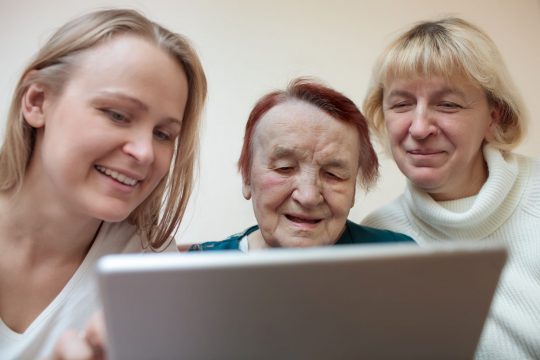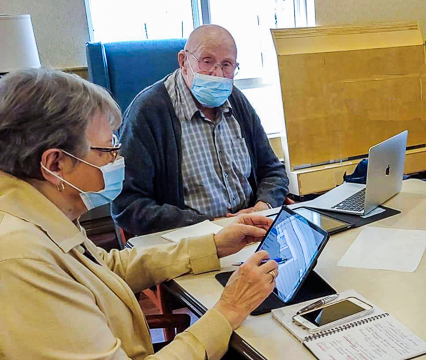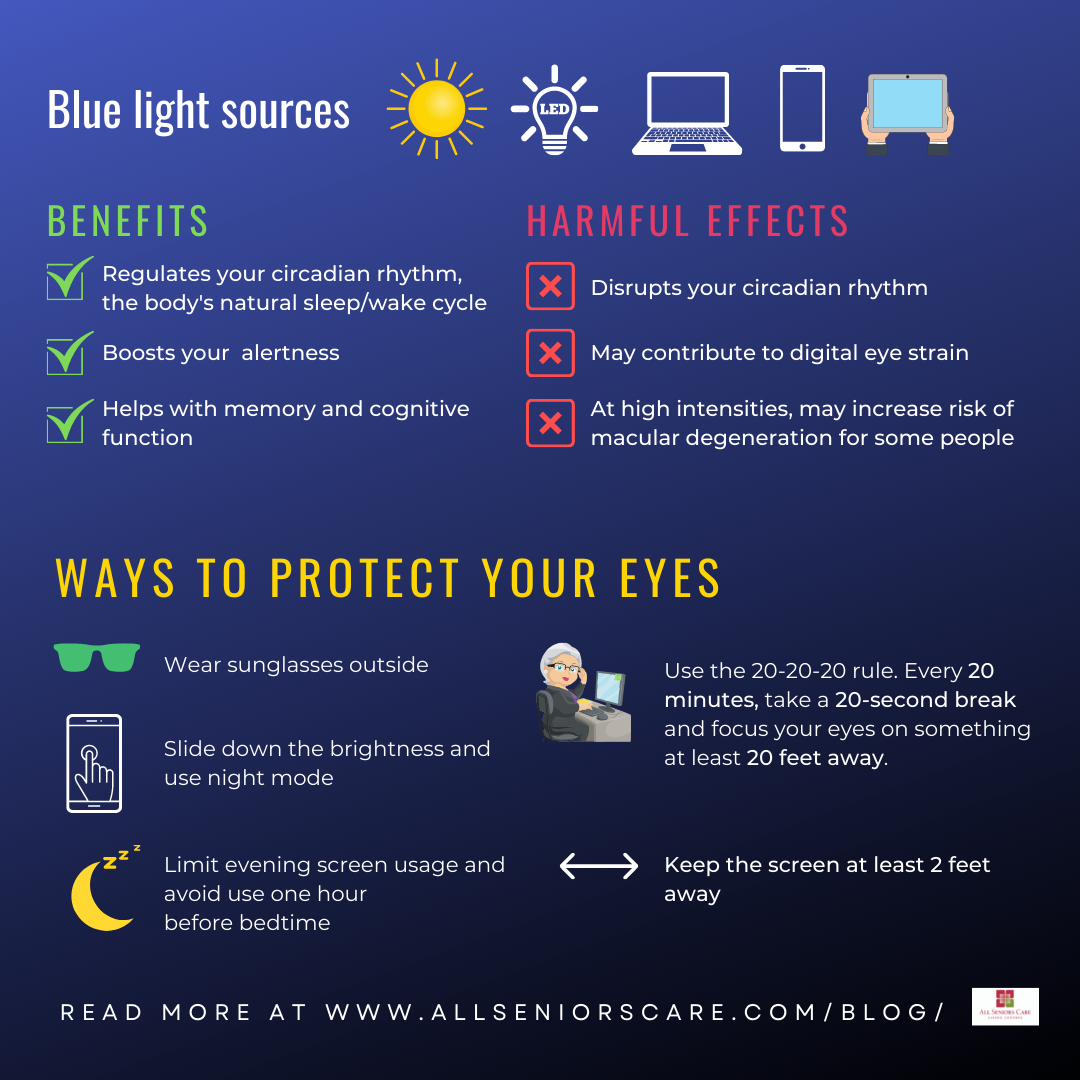
Much ado is made about today’s screen-obsessed youth. However, it turns out young people aren’t the demographic who spend the most time in front of screens.
Older adults are spending more and more time using digital devices. They check social media multiple times per day, watch movies, read e-books, and check e-mail. In this era of frequent screen use, we wondered — does the amount, color, and timing of the light we’re exposed to affect the complex systems in our bodies?
As it turns out, the ominous blue light coming from your computer isn’t necessarily the villain it’s made out to be.
Blue Light Basics
Each color in the visible light spectrum has a different wavelength and energy level. Blue light has shorter wavelengths and higher energy than other colors. In large amounts, high-energy light from the sun — like ultraviolet rays and blue light — can raise your risk of eye disease. That has caused concerns about whether blue light from digital screens is harmful.
Blue light also comes from manmade sources, like:
- Fluorescent lights.
- CFL bulbs.
- LED lights.
- LED televisions.
- Computer monitors, tablets, and smartphones.
According to Dr. Harry Bohnsack , President of the Canadian Association of Optometrists, “we know that blue light can cause harm if it’s high intensity”, says Dr. Bohnsack. “Blue light and UV from sunlight sources are at high enough levels to cause harm. But will screens cause harm? Screens have a lot lower amount of emission. Based on the current evidence, blue light from electronic devises doesn’t do harm to the retina.”
And yet, there is concern over the long-term effects of screen exposure because of the close proximity of the screens and the length of time spent looking at them.
Blue Light Can Keep You From Falling Asleep

Just because blue light isn’t harming your retina doesn’t mean your electronic devices are harmless, or that blue light is not affecting you physiologically.
“Natural blue light is important for certain things like maintaining our circadian rhythm”, explains Dr. Bohnsack. “It’s the body’s signal that we should be alert and awake and if it’s introduced at the wrong time of day, it can tell you to be alert when you’re actually trying to go to sleep. “
Exposure to too much artificial blue light, especially at night, from electronic devices may lead to poor sleep quality, difficulty falling asleep, and daytime fatigue because it has been shown to suppress melatonin production.
Blue Light Benefits
Some blue light is needed to maintain your overall health. Some of the benefits of blue light include:
- Boosts your alertness
- Helps with memory and cognitive function
- Elevates your mood
- Regulates your body’s natural sleep/wake cycle)
What Can You Do to Protect Your Eyes from Blue Light?
“It important to keep things in perspective”, says Dr. Bohnsack. “I don’t think we need to worry about what screens are doing to our eyes.’
“At the same time, when we’re spending time outdoors – outdoors is a huge source UV and blue light –both of which have the potential to increase macular degeneration and cataracts. We should all be wearing sunglasses.”
Screen hygiene: Focus on Reducing Eye Strain
One reason that seniors may believe that blue light is damaging their eyes is because they may notice some eye fatigue and discomfort after looking at a screen for a while. However, this is merely eye strain and does not lead to long-term damage.
If constant exposure to blue light from smart phones, tablets, and computer screens is causing concern, there are a few strategies to try:
Screen time
Try to decrease the amount of time spent in front of these screens and/or take frequent breaks to give your eyes a rest. Read about the 20-20-20 Rule here.
Slide down the brightness of your screen
Adjusted the slider to adjust the brightness. Turning down screen intensity can lessen impact. Most digital devices today have night shift mode that automatically turns down brightness and offers blue-light reduction mode.
Put some distance between you
If you find yourself holding your device close to your face, move it away. Remember, too, constantly looking down at a screen can also cause neck strain and even damage. Aim to keep your device 2 feet away.
Blue light filters
Some people might need blue light filtration. Screen filters decrease the amount of blue light given off from devices that could reach the retina in our eyes, especially in the 3 hours before bed time. Discuss this directly with optometrist or ophthalmologist.
Limit screen time
Try not to use your devices directly before bedtime. Set a limit of turning off your devices at least one hour before bedtime.
Get an eye exam
It’s also possible the eye strain and headaches occur because your glasses aren’t appropriate for screen use. If you are a senior using bifocals, that means your eyes have lost some flexibility and have a harder time reshaping to accommodate looking at items near and far.
Wear sunglasses outdoors
Each time you bask in the sun without eye protection, you increase your risk of serious disease. Some medications, like diuretics, non-steroidal anti-inflammatory drugs (NSAIDs), and antiarrhythmic medications can cause increased sensitivity to the sun. Check with your doctor or pharmacist if you are unsure.
Blue Light Myth Debunked
You’re not going to do any long-term damage to your eyes or vision by spending hours on your digital devices. But doing so without breaks can contribute to eye discomfort, difficulty focusing, dryness, and headaches.
“In the age of Covid-19, electronic devices are the way that we connect with family and loved ones; it’s how we get news and entertainment”, Dr. Bohnsack concludes. “I don’t want people to worry. As time goes on, we’ll know more. For now, devices can be a great way to stay connected with others”.
If you’re interested in learning more about our various communities across Canada, explore our website. You will find answers to important questions like what are assisted living costs and what is the best care option for someone with dementia. Click here to learn more about our senior housing in Regina, and retirement apartments in Whitby, and new retirement developments around Canada.
Writer – Julianna McLeod
Julianna is a health and wellness expert at All Seniors Care. Her mission is to create content that empowers seniors to form sustainable solutions for lasting health and happiness. She is an experienced writer, editor, and Recreational Therapist living in Toronto.

